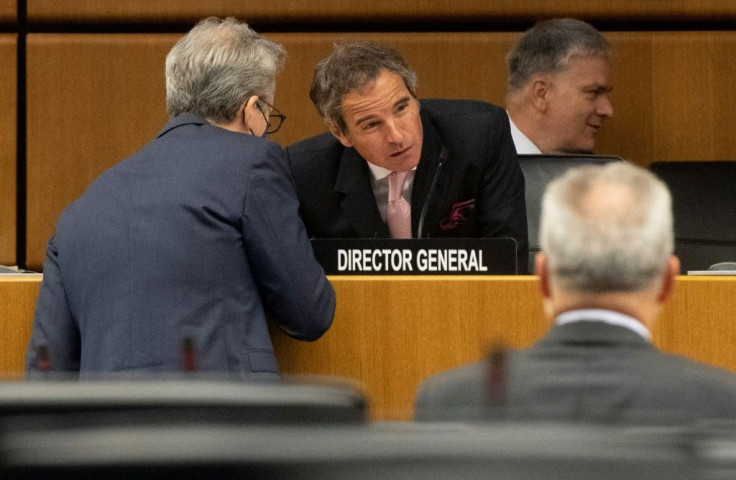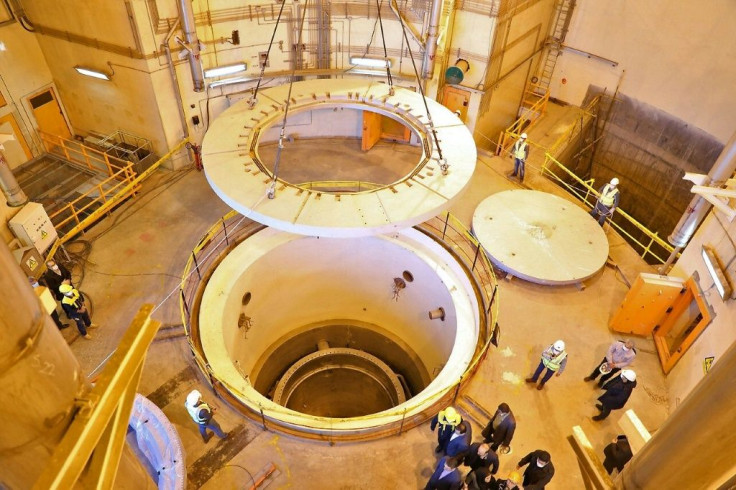Iran Warns Against UN Nuclear Watchdog Resolution
Iran criticised on Tuesday a plan to put forward a resolution at a meeting of the UN's nuclear watchdog urging the country to allow access to two disputed sites.
European states are expected to submit the resolution at the Vienna-based International Atomic Energy Agency's (IAEA) board of governors' meeting this week.
"Introduction of this resolution aiming to call on Iran to cooperate with the Agency... is disappointing and absolutely counterproductive," said Kazem Gharib Abadi, Iran's UN ambassador in Vienna.
Diplomats say the resolution will call on Iran to provide access to two locations where past nuclear activity may have occurred -- sites to which the IAEA has been trying to gain access for months.
At the start of this week's meeting on Monday, IAEA Director General Rafael Grossi repeated his appeal to Iran to "cooperate immediately and fully" and grant access.
Even though the sites in question are not thought to be directly relevant to Iran's current nuclear programme, the agency says it needs to know if activities going back almost two decades have been properly declared and all materials accounted for.

But in Tuesday's statement, Gharib Abadi warned that if the resolution was adopted, "Iran would have no choice but to take appropriate measures, the consequences of which would be upon the sponsors of such political and destructive approaches".
He did not specify what these measures would be.
Gharib Abadi argued that the IAEA's access requests were based on allegations from Iran's arch-enemy Israel.
Additional information provided by the IAEA in support of its requests "were merely some commercial satellite imageries that contained no convincing underlying reason" to provide access, he added.

The IAEA's board of governors has not passed a resolution critical of Iran since 2012.
While a new resolution would be largely symbolic in character, it could be a prelude for the dispute being referred to the UN Security Council, the only UN body that can impose sanctions.
However, there is the added complication that due to the coronavirus pandemic the IAEA board of governors' meeting is taking place in a virtual format.
Russia has been particularly active in resisting the prospect of remote voting and on Monday it was decided that a physical meeting would be convened if a vote needs to be held.
It is not clear how quickly such a meeting could be organised.
Also on Tuesday Iranian Foreign Minister Mohammad Javad Zarif visited Moscow where his Russian opposite number Sergei Lavrov pledged to stand by Tehran, while referring to "developments taking place right now in Vienna" and "ideas our western friends are floating in New York".
"We will be very firmly opposing any attempts to use this situation in order to manipulate the Security Council and to promote an anti-Iranian agenda," Lavrov said.
Despite the row over the two sites, the IAEA says it still has the access it needs to Iran's nuclear facilities to monitor its current activities, as the agency is mandated to do under the landmark deal between Iran and world powers reached in 2015.
The deal has been unravelling since US President Donald Trump withdrew from it two years ago and went on to re-impose swingeing economic sanctions on Iran.
In retaliation Iran has been slowly abandoning limits on its activities set out under the deal, including on the size and enrichment level of its uranium stockpile.
Iran has accused the European parties to the deal -- France, the UK and Germany -- of not doing enough to mitigate the impact of American sanctions.
In his statement, Gharib Abadi hinted that pressing ahead with the resolution could cause "complication and difficulties" for the future of the 2015 accord.
© Copyright AFP 2024. All rights reserved.





















